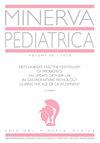Effects of vitamin D prophylaxis on oral iron treatments of iron deficiency anemia.
IF 2.6
4区 医学
Q2 Medicine
引用次数: 1
Abstract
BACKGROUND Iron deficiency anemia causes a decrease in immune response to infections, physical working capacity and response to metabolic stress. It also causes behavioral, perceptual and cognitive disorders. Therefore, as soon as iron deficiency anemia is diagnosed, it should be treated immediately. In this study, it was investigated retrospectively whether there was a difference in treatment efficacy between the administration of oral ferrous or ferric iron and vitamin D at the same time and at different time. METHODS A total of sixty patients under 1 year who attended the pediatrics outpatient clinic for pale and diagnosed with iron deficiency anemia. Patients were randomly divided into 4 groups. Anemia was defined as hemoglobin below <2 SD according to age and gender. Iron deficiency was definied with serum iron, iron-binding capacity, ferritin and transferin saturation below the range for age and gender appropriates. All patients were seen at the outpatient clinic for 1st, 3rd month of the treatment. RESULTS There were a statistically significant differences between the groups in terms of increase in Hb values according to time (1st month, 3rd month, 1st and 3rd month). There was no statistically significant difference between the groups in terms of the recovery of anemia after treatment. CONCLUSIONS It was concluded that iron treatment in babies with iron deficiency anemia is not affected by the administration of vitamin D prophylaxis at the same time or at different times, and therefore both treatments can be administered at the same time to increase drug compliance.预防维生素D对缺铁性贫血口服铁治疗的影响。
背景:缺铁性贫血导致对感染的免疫反应、身体工作能力和对代谢应激的反应下降。它还会导致行为、知觉和认知障碍。因此,一旦诊断出缺铁性贫血,应立即进行治疗。本研究回顾性研究口服亚铁或三铁与维生素D同时服用与不同时间服用在治疗效果上是否存在差异。方法选取60例1岁以下儿科门诊就诊的面色苍白、诊断为缺铁性贫血的患者。患者随机分为4组。贫血根据年龄和性别定义为血红蛋白< 2sd。缺铁的定义是血清铁、铁结合能力、铁蛋白和转移蛋白饱和度低于与年龄和性别相适应的范围。所有患者在治疗的第1、3个月均在门诊就诊。结果两组患者Hb值按时间(第1个月、第3个月、第1个月、第3个月)升高情况比较,差异均有统计学意义。两组患者治疗后贫血的恢复情况无统计学差异。结论缺铁性贫血患儿的铁治疗不受同时或不同时间给予维生素D预防治疗的影响,可同时给予两种治疗以提高药物依从性。
本文章由计算机程序翻译,如有差异,请以英文原文为准。
求助全文
约1分钟内获得全文
求助全文
来源期刊

Minerva pediatrica
PEDIATRICS-
CiteScore
2.70
自引率
3.80%
发文量
1
审稿时长
>12 weeks
期刊介绍:
Minerva Pediatrica publishes scientific papers on pediatrics, neonatology, adolescent medicine, child and adolescent psychiatry and pediatric surgery. Manuscripts may be submitted in the form of editorials, original articles, review articles, special articles, letters to the Editor and guidelines. The journal aims to provide its readers with papers of the highest quality and impact through a process of careful peer review and editorial work.
 求助内容:
求助内容: 应助结果提醒方式:
应助结果提醒方式:


